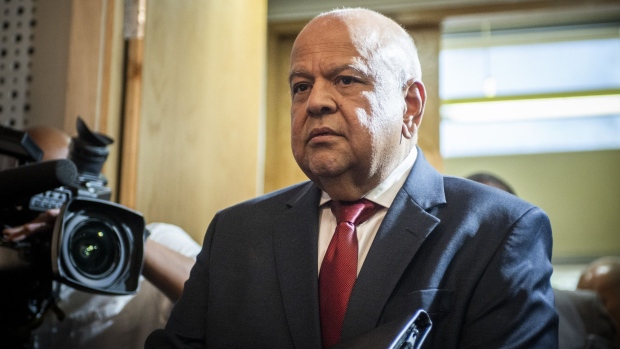Nov 30, 2021
Lax South Africa Law Enforcement Hinders State Firms’ Turnaround
, Bloomberg News

(Bloomberg) -- South Africa’s bid to turn around state companies systemically looted during ex-President Jacob Zuma’s rule are being undermined because those responsible for the plunder aren’t being held to account.
Law enforcement is happening at “a fairly relaxed pace,” Public Enterprises Minister Pravin Gordhan, who oversees most of the biggest state firms, said in a Nov. 26 interview. “We haven’t increased sufficiently the risk factor of you being caught and facing the consequences.”
The government estimates that more than 500 billion rand ($31 billion) was stolen from its coffers during Zuma’s nine-year tenure, with power utility Eskom Holdings SOC Ltd. and freight rail and port operator Transnet SOC Ltd. among the targets.
Witnesses who’ve testified before a judicial commission established in 2018 to investigate the theft allege that it was largely spearheaded by members of the Gupta family and took place with Zuma’s tacit consent. The Guptas, who’ve left the country, and the former president, who has been freed on medical parole following his conviction and jailing for defying a court order to testify before the panel, deny wrongdoing.
President Cyril Ramaphosa, who succeeded Zuma in 2018, has identified the fight against graft as a top priority. While he’s taken steps to strengthen the National Prosecuting Authority and revamp crime-fighting units, they still have some way to go to reduce a huge backlog in cases and tackle new ones.
‘Lack of Urgency’
There are scattered examples of people who stole from state entities being charged and prosecuted, but “there are a whole lot waiting in the queue as well,” Gordhan said. “If there is anything that keeps me awake, it is the lack of urgency on the part of the law-enforcement side, because we have to act as a whole of state on all of these matters.”
The poor performance of state companies has curbed output and economic growth. Eskom has subjected the country to more than a decade of rolling blackouts, while Transnet lacks capacity to transport sufficient iron ore and coal shipments and its container ports are ranked by the World Bank and IHS Markit among the world’s worst-performing.
The government is considering establishing a new management model for the state companies to improve their performance and is selling a majority stake in the state airline that could serve as a model for other partnerships with private investors, according to Gordhan.
The focus must however be on “change, transformation and repositioning vital entities like Eskom so that they serve the national interest,” he said. “That is the objective, not what you own and who owns it that should matter. The rest of it is all cheap politics.”
©2021 Bloomberg L.P.


